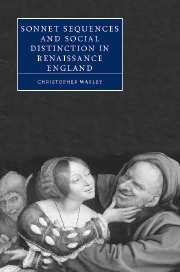Book contents
- Frontmatter
- Contents
- Preface
- 1 Sonnet sequences and social distinction
- 2 Post-romantic lyric: class and the critical apparatus of sonnet conventions
- 3 “An Englishe box”: Calvinism and commodities in Anne Lok's A Meditation of a Penitent Sinner
- 4 “Nobler desires” and Sidney's Astrophil and Stella
- 5 “So plenty makes me poore”: Ireland, capitalism, and class in Spenser's Amoretti and Epithalamion
- 6 “Till my bad angel fire my good one out”: engendering economic expertise in Shakespeare's Sonnets
- 7 “The English straine”: absolutism, class, and Drayton's Ideas, 1594–1619
- Afterword: Engendering class: Drayton, Wroth, Milton, and the genesis of the public sphere
- Notes
- Index
- Cambridge Studies in Renaissance Literature and Culture
6 - “Till my bad angel fire my good one out”: engendering economic expertise in Shakespeare's Sonnets
Published online by Cambridge University Press: 22 September 2009
- Frontmatter
- Contents
- Preface
- 1 Sonnet sequences and social distinction
- 2 Post-romantic lyric: class and the critical apparatus of sonnet conventions
- 3 “An Englishe box”: Calvinism and commodities in Anne Lok's A Meditation of a Penitent Sinner
- 4 “Nobler desires” and Sidney's Astrophil and Stella
- 5 “So plenty makes me poore”: Ireland, capitalism, and class in Spenser's Amoretti and Epithalamion
- 6 “Till my bad angel fire my good one out”: engendering economic expertise in Shakespeare's Sonnets
- 7 “The English straine”: absolutism, class, and Drayton's Ideas, 1594–1619
- Afterword: Engendering class: Drayton, Wroth, Milton, and the genesis of the public sphere
- Notes
- Index
- Cambridge Studies in Renaissance Literature and Culture
Summary
“Two loves I have”: classification struggle in the Sonnets
This chapter makes more explicit the intersection of social position, gender, and economic language in sonnet sequences by looking at Shakespeare's Sonnets. We have already seen that the recourse to financial metaphors is a central component of the imaginative construction of social space in sonnet sequences in this period. Biblical interpretation in Lok's work is aligned with commodity circulation. Astrophil's interaction with Stella takes the form of his succumbing to “Reason's audit,” a procedure that makes clear his dependence upon Stella's feminine “riches.” Daniel represents Delia as an account book, and Spenser's Amoretti and Epithalamion invokes new conceptions of capital and land possession in the speaker's desire for his lady. In each case, social distinctions are also partly set in motion by gender distinctions, and both are intimately related to a financial language – the “use,” “accounts,” and “audits” that compulsively appear in these works. Such economic language pervades Shakespeare's Sonnets, as a number of studies have detailed. What has been less remarked on is the function of this language in producing, rather than reflecting, a social position; my interest in this chapter is less the economy, the market, or usury as autonomous discourses, than the social position that emerges from Shakespeare's appropriation of them.
The production of this social position is apparent when we focus on the form of the Sonnets.
- Type
- Chapter
- Information
- Sonnet Sequences and Social Distinction in Renaissance England , pp. 123 - 151Publisher: Cambridge University PressPrint publication year: 2005



